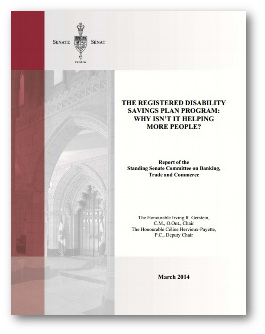CMHA Ottawa’s efforts to inform government decision-makers about a key financial issue for people with serious mental illness (SMI) has led to results published by Canadian senators.  The report, Registered Disability Savings Plan Program: Why Isn’t It Helping More People? has been tabled by the Standing Senate Committee on Banking, Trade and Commerce. The report is, in parts, reflective of commentary provided by officials from the CMHA branch in the nation’s capital.
The report, Registered Disability Savings Plan Program: Why Isn’t It Helping More People? has been tabled by the Standing Senate Committee on Banking, Trade and Commerce. The report is, in parts, reflective of commentary provided by officials from the CMHA branch in the nation’s capital.
Last February, CMHA Ottawa Executive Director Tim Simboli and Board Chair Karen Nelson presented to the Standing Senate Committee about the Registered Disabilities Savings Plan (RDSP).
The RDSP can provide an important contribution to the enduring financial security for people with disabilities. But the RDSP can be difficult to access or understand for individuals with SMI, who are clients regularly served by CMHA branches and similar mental health organizations.
The circumstances of those with SMI and the realities of their lives and their finances make accessing RDSP difficult. These realities coupled with barriers – such the requirement for identification and an address to open a bank account, the need to file tax returns every year, and the collection of medical documentation and finding a doctor to complete the Disability Tax Credit form – has prevented the vast majority of branch clients with SMI from taking advantage of the program in the six years since the RDSP was introduced by the federal government.
“The message we would like to bring is that whenever you’re providing services to individuals with disabilities, you really have to consider the disability itself and the limiting factors that it puts on any kind of process,” Simboli told Senators.
“With our clients, we’re dealing with people who may have cognitive disabilities, cognitive inadequacies, but they also have erratic lifestyles,” he said, adding that getting them to access RDSPs would be a tremendous benefit to them and to their long-term health.
The senators were attentive and fully engaged in a dialogue on how best to adapt the processes to better serve individuals with SMI. CMHA Ottawa appreciates that the organization was recognized in the final report and that comments from branch leadership were reflected in the final report.